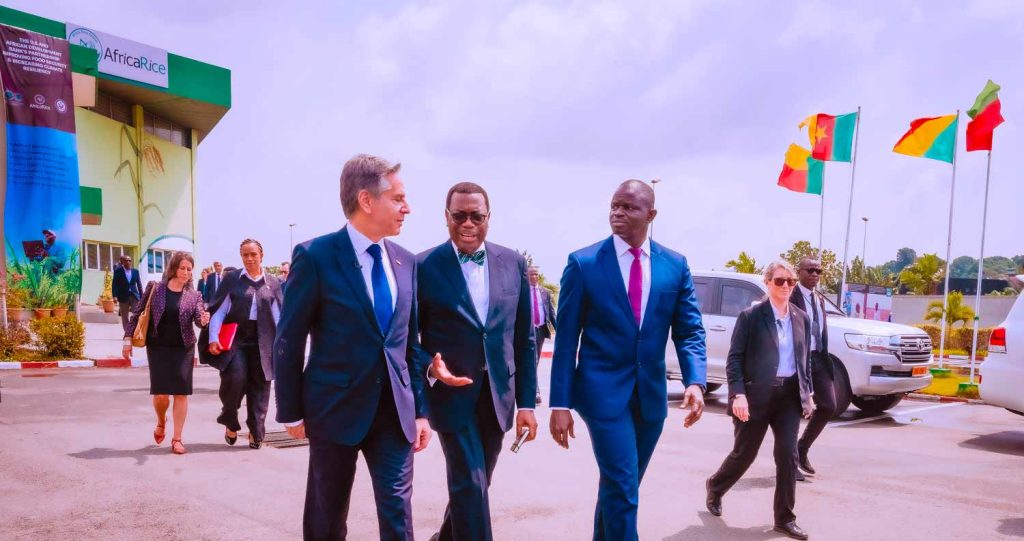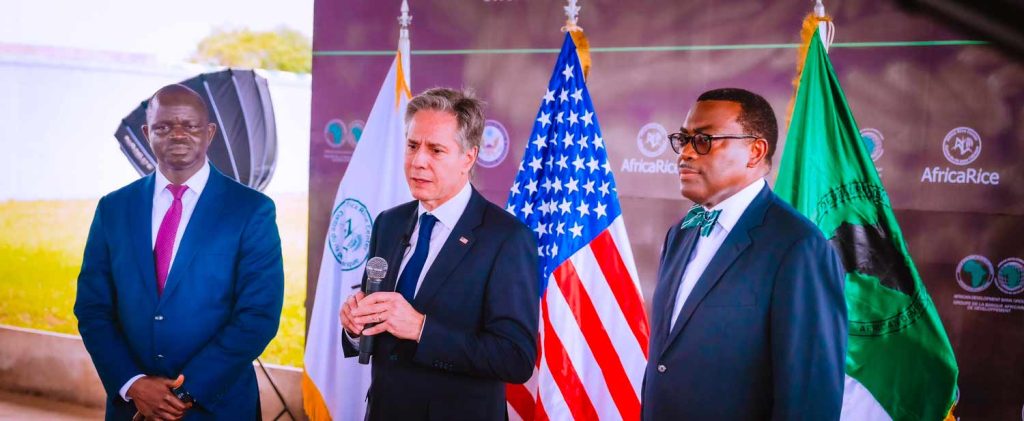US and AfDB forge stronger ties to boost food production

![]()

Photo
US Secretary of State Antony Blinken (left) visited AfricaRice HQ in Abidjan, where he praised the African Development Bank Group’s work to improve Africa’s food security. He is welcomed by African Development Bank Group President Akinwumi Adesina (second left) and AfricaRice DG Baboucarr Manneh.
United States Secretary of State Antony Blinken has praised the African Development Bank (AfDB) Group for the exceptional efforts it is undertaking to help Africa feed itself and the rest of the world.
“Extraordinary work is being done to get to a place where Africa feeds itself and a place where Africa feeds the world. I’m convinced that can happen,” Secretary of State Blinken said during a visit hosted by African Development Bank Group President, Dr. Akinwumi A. Adesina in Abidjan on Tuesday. The two met at the headquarters of AfricaRice—a pan-African centre of excellence for rice research, development, and capacity building that implements Bank agricultural programmes.
Welcoming Secretary Blinken, President Adesina said, “This is the first time that a US Secretary of State would visit the African Development Bank and its work. Secretary Blinken’s visit is historic and provides great momentum for our work to feed Africa. I applaud Secretary Blinken’s strong leadership and commitment to food security and look forward to working closely with him and the US government to advance our joint efforts to support Africa to feed itself and help feed the world.”
Thanking the US for its support to the Bank Group’s key agricultural initiatives, Dr. Adesina said: “I applaud the work President Biden is doing for global food security. I’m delighted with the partnership we have with the US Government to help us move forward on food security in Africa.”
Dr. Adesina also thanked Secretary Blinken for a new grant of $9.5 million to support the Bank’s Technologies for African Agricultural Transformation initiative, or TAAT. The grant, which is a part of the larger US Government “Feed the Future” global hunger initiative, will be used for the second phase of the Bank programme called TAAT II, to help African countries increase food production, introduce climate-smart technologies, and expand extension services. To date TAAT has deployed climate-resilient agricultural technologies and fertilizers to 13 million African farmers in 40 African countries to help boost the continent’s food production and food security. The USAID grant will help expand the reach of TAAT II further.

Photo
Speaking to the press, Secretary Blinken said the Biden administration was convinced that there is tremendous potential in investing in the production of crops that are climate-resilient and highly nutritious.
The United States will work with the African Development Bank to identify opportunities to partner with the US State Department’s Vision for Adapted Crops and Soils (VACS) activities and develop an investment strategy.
TAAT aims to double the productivity of staple crops, livestock, and fisheries, by making proven technologies available to more than 40 million agricultural producers by 2025. This will produce an additional 120 million tons of food.
Alluding to that work, Blinken said: “The African Development Bank is making the necessary investments in sustainable production in a smart effective way and along with its AfricaRice programme maximising crops and producing crops that can stand up to climate change.”
Commending the African Development Bank President Dr. Adesina for his global leadership, Secretary Blinken said, “I applaud the Bank and your leadership for the powerful and inspiring impact of your initiatives. You are setting an example for others about how a bank is run.”
Speaking to the press, Secretary Blinken said the Biden administration was convinced that there is tremendous potential in investing in the production of crops that are climate-resilient and highly nutritious.
Beyond crops such as rice, Secretary Blinken said the Biden administration was convinced that there is tremendous potential in investing in the production of crops that are climate-resilient and are highly nutritious including some of Africa’s neglected traditional foods.
The Bank launched the AfricaRice initiative in 2018 to boost rice production. It now has 28 country members across Africa with some 15 of those expecting to shortly reach rice self-sufficiency.
“Since 2018 rice yields have increased by 25% and livelihoods by more than 31%,” said AfricaRice Director General Dr. Baboucarr Manneh, who also took part in the visit.
The United States of America is the second-largest shareholder of all African Development Bank member countries, and the largest contributor in cumulative terms to the African Development Fund, which provides concessional funding to Africa’s poorest countries. During the visit, President Adesina highlighted the sustainable impact of United States investment in Bank operations that align with shared priorities in Africa.
The Bank and the US Government share a long-standing, results-oriented track record of collaboration on several issues, including:
Food Security: In December 2022, the United States announced $15 million(link is external) to support the Bank’s African Emergency Food Production Facility, introduced in May 2022 in response to food supply disruptions across the continent arising from the Russia-Ukraine war.
Agricultural Transformation: The US Administration also recently pledged support for the Africa Disaster Risk Financing Programme (ADRiFi) to help African nations be more resilient to climate shocks like flooding and drought.
Corridors: The US and the African Development Bank are among the signatories to a memorandum of understanding that joins global partners to mobilize resources for the Lobito Corridor. When completed, the rail and road programme will expand an economic corridor connecting Angola, the Democratic Republic of Congo and Zambia to global markets. The programme will also provide opportunities for agricultural value chain development that use the transport infrastructure along the Lobito corridor. The Bank has committed $500 million to support this project. The Bank is also working with the US and other development partners to approve and fund corridors across the continent.
African Development Bank Group President Akinwumi Adesina shows US Secretary of State Antony Blinken a variety of rice grown from climate-resilient seeds from the Bank’s TAAT programme during a visit to AfricaRice’s HQ in Abidjan.
The African Development Bank Group is contributing to the sustainable economic development and social progress of African countries. The Bank operates around five strategic priorities: Industrialize Africa, Integrate Africa, Light up and Power Africa, Feed Africa, and Improve the quality of life for the people of Africa.




